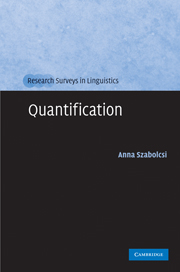Book contents
- Frontmatter
- Contents
- List of figures
- List of tables
- Acknowledgements
- 1 What this book is about and how to use it
- 2 Generalized quantifiers and their elements: operators and their scopes
- 3 Generalized quantifiers in non-nominal domains
- 4 Some empirically significant properties of quantifiers and determiners
- 5 Potential challenges for generalized quantifiers
- 6 Scope is not uniform and not a primitive
- 7 Existential scope versus distributive scope
- 8 Distributivity and scope
- 9 Bare numeral indefinites
- 10 Modified numerals
- 11 Clause-internal scopal diversity
- 12 Towards a compositional semantics of quantifier words
- Notes
- Bibliography
- Index
6 - Scope is not uniform and not a primitive
Published online by Cambridge University Press: 05 June 2012
- Frontmatter
- Contents
- List of figures
- List of tables
- Acknowledgements
- 1 What this book is about and how to use it
- 2 Generalized quantifiers and their elements: operators and their scopes
- 3 Generalized quantifiers in non-nominal domains
- 4 Some empirically significant properties of quantifiers and determiners
- 5 Potential challenges for generalized quantifiers
- 6 Scope is not uniform and not a primitive
- 7 Existential scope versus distributive scope
- 8 Distributivity and scope
- 9 Bare numeral indefinites
- 10 Modified numerals
- 11 Clause-internal scopal diversity
- 12 Towards a compositional semantics of quantifier words
- Notes
- Bibliography
- Index
Summary
Different quantifiers, different scopes
In Chapter 2 we discussed the classical notion of scope, stressing its semantic core and the freedom in its grammatical implementation. What we did not ask is how well the predictions of the classical theory (Montague, May, Hendriks, etc.) match up with the data. One feature of the classical theory is that it treats all quantifier phrases alike. Thus, as soon as two expressions are deemed to be quantifier phrases they are predicted to exhibit the same scope behavior. Also, nothing but a stipulation prevents quantifier phrases from scoping out of their clauses, and the stipulation makes all of them clause-bounded. Unfortunately, these predictions are not borne out. The following small sample of data will drive this home.
In (1)–(2) the prepositional object every show easily scopes over the subject, but more than one show does not:
(1) More than one soprano sings in every show.
ok ‘every show has more than one (potentially different) soprano in it’
(2) Every soprano sings in more than one show.
#‘more than one show has every soprano in it’
In (3)–(4) the direct objects a famous soprano and more than one famous soprano may scope over the negation, but in (5) every famous soprano cannot:
(3) Zdenka did not greet a famous soprano.
ok ‘there is a famous soprano who Zdenka did not greet’
(4) Zdenka did not greet more than one famous soprano.
ok ‘there is more than one famous soprano who Zdenka did not greet’
[…]
- Type
- Chapter
- Information
- Quantification , pp. 83 - 90Publisher: Cambridge University PressPrint publication year: 2010

